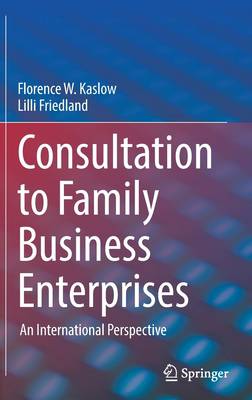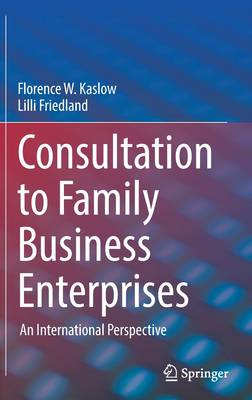
- Retrait gratuit dans votre magasin Club
- 7.000.000 titres dans notre catalogue
- Payer en toute sécurité
- Toujours un magasin près de chez vous
- Retrait gratuit dans votre magasin Club
- 7.000.000 titres dans notre catalogue
- Payer en toute sécurité
- Toujours un magasin près de chez vous
Consultation to Family Business Enterprises
An International Perspective
Florence W Kaslow, LILLI Friedland
Livre relié | Anglais
94,95 €
+ 189 points
Format
Description
While family businesses have existed for millennia all over the world, it is only in the past few decades that professional consultants have been utilized to help them function more effectively. This engaging, up to the minute volume explores the varied and complex world of family enterprises as they now exist in the third decade of the 21st century. Attention is given to the factors unique to family businesses in their attention to perpetuating family values, traditions, loyalties and their legacy to future generations. Consultants may be drawn from law, finance and accounting, organizational psychology, or family psychology (with its special emphasis on understanding the family relationship system). The book describes methods of assessment and how to effectively communicate the results as well as techniques of consulting and provides an invaluable description of what is necessary to be and become a family business consultant.
Readers will benefit from explorations of
G. Andrew H. Benjamin, JD, PhD, ABPPPast President, American Academy of Couple & Family Psychology
Past President, American Board (ABPP) of Couple & Family Psychology Clinical Professor of Psychology & Affiliate Professor of Law, University of Washington
Readers will benefit from explorations of
- A new model featuring 8 inter-related business domains
- Cybersecurity issues and how to handle them
- Working collaboratively with financial and legal professionals
- Comprehensive coverage of research based assessment instruments
G. Andrew H. Benjamin, JD, PhD, ABPPPast President, American Academy of Couple & Family Psychology
Past President, American Board (ABPP) of Couple & Family Psychology Clinical Professor of Psychology & Affiliate Professor of Law, University of Washington
Spécifications
Parties prenantes
- Auteur(s) :
- Editeur:
Contenu
- Nombre de pages :
- 152
- Langue:
- Anglais
Caractéristiques
- EAN:
- 9783030720216
- Date de parution :
- 18-12-21
- Format:
- Livre relié
- Format numérique:
- Genaaid
- Dimensions :
- 156 mm x 234 mm
- Poids :
- 426 g







